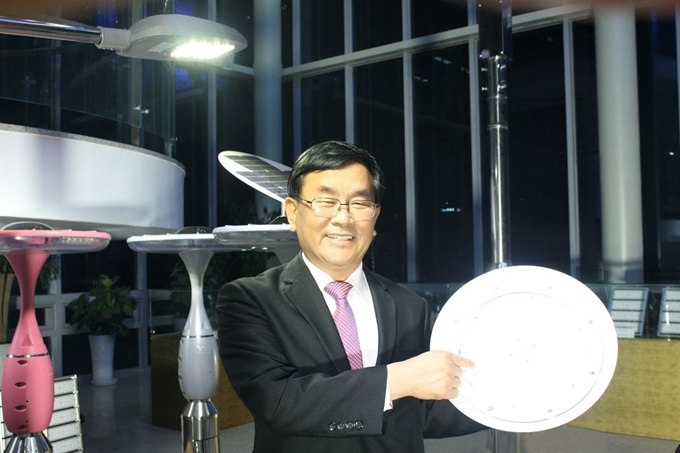테크엔 이영섭 대표

/그림 2이영섭 (주)테크엔 대표가 본인이 개발한 방열장치를 넣은 LED조명등을 들고 포즈를 취했다. 머리 위로 LED가로등 샘플제품이 보인다. 김광원기자 jang750107@hankookilbo.com CEO of TECHEN Co. poses with an LED light with a radiator that he developed. LED street lamp samples are visible overhead.
“발광다이오드(LED)에 흐르는 전류 중 70%는 열로 변하는데, 이 과정에 LED 단자에 손상을 줍니다. 테크엔의 독자 방열기술로 이 열을 효과적으로 낮추면 기존 5~7년가량인 LED 수명이 20년까지 늘어납니다.”
LED 조명업계의 신흥 강자 대구 달서구 다사읍 (주)테크엔 이영섭(59) 대표. 그는 LED조명 수명을 획기적으로 늘려주는 방열기술로 국내외 조명시장을 개척하는 기술인 출신 경영인이다. 2009년에 회사를 설립한 이후 2년 만에 10억원 매출을 달성했고, 이듬해 100억원 고지에 올랐다. 지난해엔 40여 명의 임직원이 142억원의 매출을 올리며 대구시 ‘스타기업’에도 선정됐다. 스타기업은 대구시가 기술경쟁력이 뛰어난 지역 중소기업 중 지역경제 성장을 주도할 업체를 선정해 중견기업으로 성장할 수 있도록 각종 지원을 하는 제도다.
◇3,500억대 인도네시아 태양광 가로등사업 진출
테크엔은 방열기술을 발판으로 인도네시아가 추진 중인 3,500억원대 LED가로등 시장 진출을 눈앞에 두고 있다.
이 대표는 “인도네시아 태양광LED가로등 사업 수주 경쟁에서 독일 일본 미국 등 선진 10개국 기업을 제치고 사업권을 따냈다”며 “내달 초 인도네시아 에너지ㆍ광물자원부장관 등이 직접 우리 공장을 방문해 생산 현장을 둘러본 뒤 정식 계약하면 곧바로 생산에 들어갈 예정”이라고 말했다. 자체 생산한 LED 조명등과 지지대에다 국내 대기업으로부터 태양광전지 패널을 납품받아 내년에 1,000억원 상당 등 3년간 51만 세트, 총 3,570억 원어치를 공급하게 된다. 이미 인도네시아 에너지부 장관의 최종 승인까지 난 상태라고 밝혔다.
테크엔의 경쟁력은 독보적 기술에서 나온다. LED 조명에서 발열 문제는 업계 최대 골칫거리다. 테크엔도 2009년 회사 설립 후 발열을 해결하기 위한 관련 기술 개발에 집중했다. 기본원리는 LED에서 발생한 열을 금속 전도체로 된 방열 핀을 이용해 라디에이터로 신속히 발산하는 것이다. 이전까지는 기껏 LED 단자와 라디에이터 사이에 구멍을 뚫는 것이었지만, 이 대표는 그 구멍에 금속을 채우는 방법을 시도했다. 효과 만점이었다. 광효율이 좋아지고 수명도 획기적으로 길어졌다. 효율이 높아진 만큼 LED사용량을 줄일 수 있어 가격경쟁에서도 앞설 수 있다.
금속 소재는 처음엔 납, 다음엔 구리를 쓰다가 마지막으로 은으로 바꿨다. 쉬워 보이지만 고도의 기술이 필요하다. 이 대표는 “타사 제품은 주로 알루미늄을 쓰는데, 우리는 열전도율이 훨씬 높은 은을 사용해 품질이 월등하다”며 “은이 비싸지만, 소량으로도 최고의 방열 효과를 내기 때문에 동급 타사제품보다 생산비를 10~20% 낮출 수 있다”고 자랑했다. 동을 채운 기술로 2011년 대한민국 기술대상 특별상, LED 단자에 은을 박아서 방열 속도를 20배 이상 높인 기술로 2016년 신기술개발분야 대통령상을 받았다.
◇에너지 절약형 기술 가능성에 눈떠
그는 업계에서 ‘방열장인’으로 통한다. 일본의 장학금을 받으며 국내에서 공고를 졸업한 이 대표는 그 인연으로 1979년 일본 ‘산요(三洋)전기’에 입사해 방열기술을 접했다. 1990년 퇴사 후 한국에 돌아와 전기공사업을 시작했지만 외환위기 때 대기업 하청업체들이 무더기로 쓰러지는 것을 보면서 원천 기술만이 중소기업의 살길이라는 것을 절감했다. 1997년, 고성능모터 핵심부품의 하나인 에너지 절약형 필터를 개발하는 데 성공했지만 큰 수익은 내지 못했다.
우연히 교토의정서(기후변화에 대한 유엔 기본협약)에 관한 기사를 접하면서 LED와 인연을 맺게 된다. 신재생에너지와 에너지 절약형 기술이 대세가 될 것이라고 예감했다. 2006년 LED 관련 벤처회사를 설립해 LED 가로등을 만들었지만 투자자의 배신으로 쓴맛을 보아야만 했다. 55%의 지분을 확보한 투자자의 요구로 경영권을 내 놓아야만 했다. 조달청 LED 우수조달업체 1호에 선정되었고, 중국 기업에서 350억에 발열 기술을 사겠다는 제의를 해온 즈음이었다.
이 모든 것을 포기하고 새로 세운 회사가 지금의 테크엔이다. 이후 끊임없는 기술 개발로 관련 특허도 잇따라 출연하며 아무도 따라오지 못할 기술을 만들었다. 내달 중에는 코스닥에도 상장된다.
그는 “인도네시아 수출을 시작으로 동남아시아 전체에 한국산 빛의 융단을 깔겠다는 계획이지만, 기술 우위가 무너지면 일장춘몽이 될 것”이라면서 “확고한 기술 우위를 계속 지켜나가는 것만이 우리뿐 아니라 자원 하나 없는 대한민국 중소기업들이 살아남을 수 있는 유일한 길이라고 생각한다”고 힘주어 말했다.
김광원기자 jang750107@hankookilbo.com
Heat-dissipation technology extends the 5 year LED lifetime to 20 years
"70% of the current flowing through a Light Emitting Diode (LED) turns into heat, which damages the LED terminals. By effectively reducing this heat with TECHEN Co's proprietary heat-dissipation technology, we can extend the life of LEDs from five to seven years to twenty years."
Young-sup Lee, is the 59-year-old CEO of TECHEN Co. Dasa-eup, Dalseo-gu, Daegu, and an emerging power in the LED Lighting Industry. He is the former manager of a technology company that pioneered in the lighting market bothat home and abroad with heat-dissipation technology that dramatically increased the lifespan of LED lights. Since the company was established in 2009, it achieved 1 billion won in sales in two years and reached the 10 billion won mark the following year. Last year, with forty employees' and executives' sales of 14.2 billion won, the company was chosen as the "Star Company" of Daegu. In order to help smaller companies grow into stronger, mid-size companies, the Daegu city government created the "Star Company" program. Under this system, various types of support are provided only to the companies with the highest technological competitiveness and the greatest potential to lead the growth of local companies.
Expansion into the 350 billion won solar street light business of Indonesia
TECHEN Co. plans to enter the LED streetlight market. Promoted in Indonesia and worth 350 billion won, this market is based on heat-dissipation technology.
CEO Lee said, "In competition with the solar LED street light industry in Indonesia, we won the business right away overtaking ten advanced countries including Germany, Japan, and the US." Lee also said, "We are planning to start production immediately after the Minister of Energy and Mineral Resources of Indonesia visits our factory early next month. The minister will look around the production sites and create the official contracts." TECHEN Co. will receive 100 billion won worth of solar panels from South Korean conglomerates next year, including 510,000 sets for three years, and a total of 357 billion won from self-produced LED lights. The government has already earned the final approval of the Minister of Energy of Indonesia.
TECHEN Co.'s competitiveness comes from its unrivaled technology. Heat generation in LED lights is the biggest headache for the LED industry. TECHEN Co. also focused on developing related technologies to mitigate overheating after its establishment. The basic principle is a rapid release of the LED-generated heat into the radiator using a metal conductor proofing pin. Previously, a simple hole was drilled between the LED terminal and the radiator, but CEO Lee filled the hole with metal. The effect was perfect. Not only did the light efficiency improve, but the lifespan of the LED also increased remarkably. As the efficiency increases LED usage can be reduced, thus leading to price competition.
The metal was for heat dissipation was first changed to lead, then to copper, and finally to silver. The process of choosing a metal may seem easy; however, a high level of skill is required. "Third-party products mostly use aluminum. We are superior in quality, as we use silver, which has a much higher rate of heat conductivity," CEO Lee said. "Although silver is expensive, we can reduce the production costs by ten to twenty percent compared to third-party products in our class because silver produces the best heat-dissipation effect even in small quantities." Lee was awarded the special recognition of the Korea Technology Award in 2011 with the technology that replaced the use of copper. In 2016, he won the Presidential Prize for New Technology Development with his technology that increases the heat dissipation speed by twenty times by putting silver in LED terminals.
Growing interests in the possibility of energy-saving technology
Known in the industry as a "master of heat-dissipation," Lee graduated from a technical high school in Korea and moved to Japan on a scholarship. There, he joined Sanyo Electric Co. in 1979, which provided him with experience in heating technology. After leaving the company in 1990, he returned to Korea to start an electricity construction business. Upon witnessing large companies' subcontractors collapse in droves during the Asian financial crisis, he realized that original technology was the only way for small companies to survive. In 1997, though he succeeded in developing an energy-saving filter, one of the key components of a high-performance motor, he failed to make a large profit.
By chance, he became interested in LED technology when he read an article about the Kyoto Protocol, the UN Framework Convention on climate change. He instantly predicted that renewable energy and energy-saving technologies would become a trend. In 2006, he established an LED-related venture company that created LED street lights, but unfortunately it experienced betrayal at the hands of its investors. Lee had to give up management control at the request of an investor who secured a fifty-five percent stake. Around the same time, the company was selected as the Public Procurement Service's first LED supplier, and Chinese companies offered to buy its heat-dissipation technology for 35 billion won.
Lee's new company is now known as TECHEN Co. Since then, the company has made a series of related patents through the continuous development of technologies, creations upon which no one will be able to improve. It will also be listed on the KOSDAQ next month.
"We plan to lay a carpet for Korean light throughout Southeast Asia, starting with exports to Indonesia. However, if our technological superiority collapses, it is going to be very tough," CEO Lee said, “I believe that keeping a firm's technological edge is the only way for small and mid-sized companies in Korea to survive.”
기사 URL이 복사되었습니다.


댓글0